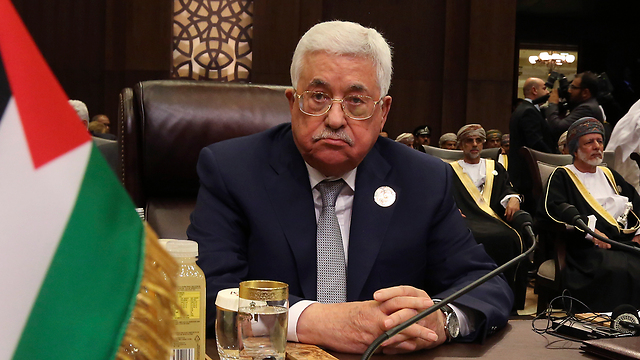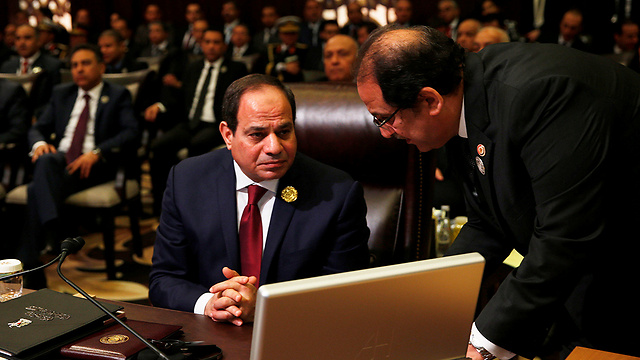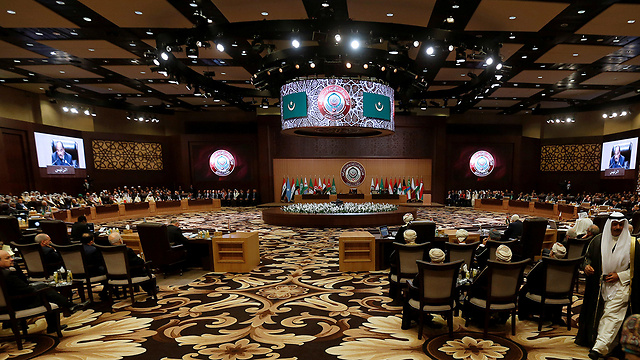Arab summit ends with 'message of peace'
The Arab summit reachs its conclusion on Wednesday, and after Jordan's Kin Abdullah II blames Israel for the stalled peace process, US Pres. Trump is given the message that any agreement must include an independent Palestinian state.
Arab leaders on Wednesday endorsed key Palestinian positions in the conflict with Israel—a signal to President Donald Trump that a deal on Palestinian statehood must precede any Israeli-Arab normalization.
In a one-day summit, they relaunched a peace plan that offers Israel normalization with Arab and Muslim states, provided it cedes lands it captured in 1967 to a future Palestinian state. A closing statement said that "peace is a strategic option" for Arab states.
"The summit has ended with a message of peace," said Jordanian Foreign Minister Ayman Safadi.
The Arab peace plan was first launched in 2002. Its renewed endorsement Wednesday would undercut Israel's proposal of a regional peace in which normalization with some Arab countries would precede a deal with the Palestinians.
The Palestinian quest for independence also served as a showcase for Arab unity in a fractured region, where leaders find themselves on opposite sides of long-running conflicts, particularly Syria's six-year-old civil war.
The 21 kings, presidents and top officials gathered on the Jordanian side of the Dead Sea, with a clear view of the West Bank on the opposite shore.
Despite demands for urgent political reform to tackle the region's challenges, including high unemployment and widespread gender inequality, the optics of the summit signaled business as usual. The leaders around the conference table were all men, most of them elderly.
Syrian President Bashar al-Assad was absent—he hasn't been invited since Syria's suspension from the 22-member Arab League following his crackdown on a 2011 uprising that quickly turned into a brutal civil war.
The gathering came ahead of White House meetings in coming weeks between Trump and three Arab leaders—Jordan's King Abdullah II, Egyptian President Abdel-Fattah el-Sissi and Palestinian President Mahmoud Abbas.
Trump hasn't yet formulated a policy on the Israeli-Palestinian conflict, but has suggested the internationally backed idea of a two-state solution isn't the only option on the table. His international envoy, Jason Greenblatt, held meetings with Abbas and the foreign ministers of Qatar and Egypt on the sidelines of the summit.
The Palestinians want to set up a state in the West Bank, Gaza Strip and east Jerusalem, lands Israel captured in the 1967 Mideast war.
Abbas told Arab leaders Wednesday that the summit resolutions will "send a clear message to the world" of a united Arab stance.
Prime Minister Benjamin Netanyahu has not formally abandoned his stated support for the two-state solution, but has stopped mentioning it in his speeches since Trump was elected. Instead, he has made vague statements about seeking a region-wide agreement.
Netanyahu frequently boasts of strong behind-the-scenes alliances with unidentified Arab countries.
In a speech this week to AIPAC, the pro-Israel American lobby group, Netanyahu once again alluded to a region-wide approach, saying that "common dangers faced by Israel and many of our Arab neighbors now offer a rare opportunity to build bridges toward a better future."
The summit's final statement urged countries around the world not to move their diplomatic missions in Israel to contested Jerusalem, a signal to Trump who said in the past he would relocate the US Embassy in Israel to the holy city.
Jordan's king told the summit's opening session that there can be no peace or stability in the region without setting up a Palestinian state alongside Israel.
Jordan has a large Palestinian population and also serves as custodian of a major Muslim-run shrine in Jerusalem that is also Judaism's holiest site.
The Al-Aqsa Mosque compound, known to Jews as the Temple Mount, has been a scene of frequent Israeli-Palestinian tensions, including clashes.
Palestinians fear Israel wants to divide it, a charge Israel denies. Jordan's monarch said "we will continue to fight any attempts to change the status quo" at the site.
The Egyptian president and Saudi Arabia's King Salman slipped out of the summit session for face-to-face talks, signaling an attempt at possible reconciliation.
A photo handout by the Egyptian delegation showed the two leaders sitting next to each other in white cushion chairs.
Relations between the two countries have been tense in recent months. Saudi Arabia is a leading supporter of the Syrian opposition, while Egypt, fearful of Islamic militants among the rebels' ranks, has pushed for a political solution that might keep Assad in power.













